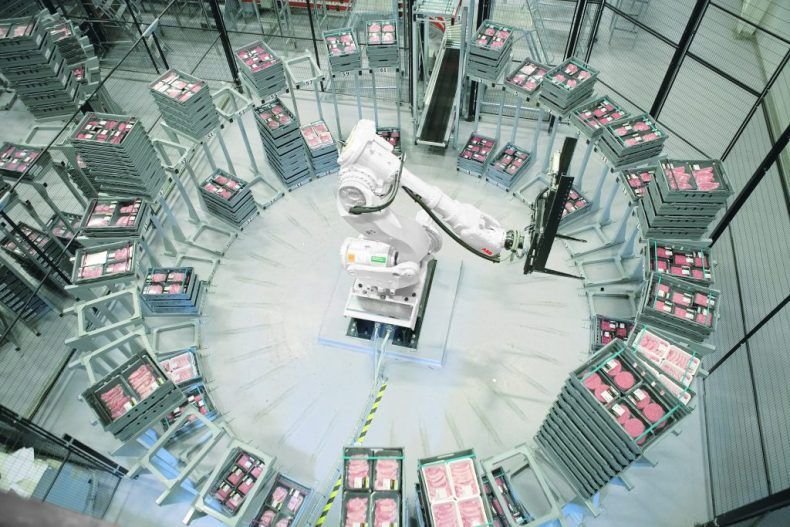Blue Belt Conveyors
These types of conveyor belt systems are used to preserve food quality and prevent contamination. The majority of belting used in the food manufacturing and processing industry are blue, food grade belts provide a high level of contrast, making it easier to spot any potential contaminants on the belt surface.
This visibility is crucial, where maintaining hygiene and preventing contamination are top priorities. The contrasting colour allows for quick identification of any foreign materials, ensuring that they can be promptly addressed to maintain food safety.
Sanitary belts, often made of materials like stainless steel or food-grade plastics, are designed to resist bacterial growth (common in poultry and meat processing), resist moisture, and withstand the rigorous cleaning processes common in the industry.
Additionally, these belts are often equipped with features like sealed edges to prevent debris accumulation.
Stainless Steel in Food Conveyors
The choice between 314 stainless steel, often selected for direct contact with food, and 304 stainless steel, suitable for non-direct contact components in food conveyor systems, is a critical consideration in the construction of equipment for the food processing industry. Stainless steel is favoured for its corrosion resistance, durability, and ease of cleaning, all essential qualities in environments where hygiene is paramount.
314 Stainless Grade for Direct Contact
Direct contact components, such as conveyor belts or surfaces that come into contact with food products, demand materials with the highest standards of corrosion resistance and cleanliness. 314 stainless steel, a variant of the austenitic family, is specifically engineered for superior resistance to corrosive agents, making it ideal for applications where frequent exposure to acids, salts, and other corrosive elements is expected.
This grade’s increased nickel content enhances its resistance to chemical corrosion and oxidation, ensuring the longevity of components in direct contact with food. Choosing 314 stainless steel for these critical parts not only maintains the structural integrity of the conveyor system but also aligns with stringent food safety standards.
304 Stainless Grade for Non-Direct Contact
While 314 stainless steel is well-suited for components in direct contact with food, non-direct contact parts like structural frames, support elements, or non-food-facing surfaces can often be constructed from 304 stainless steel. This grade offers excellent corrosion resistance and is more cost-effective than 314 stainless steel.
With a slightly lower nickel content, 304 stainless steel remains durable and resistant to corrosion in less aggressive environments. Using 304 stainless steel for non-direct contact components allows for cost-efficient construction without compromising the overall hygiene and durability of the food conveyor system. Most conveyors have non-contact components fabricated in stainless steel of this grade.
Ultimately, the use of high-quality stainless steel contributes to the reliability, longevity, and sanitary operation of food processing equipment.
Metal Detection Feature for Foreign Bodies
Metal detection in the food manufacturing industry is a crucial component of quality control and food safety protocols. Detecting and eliminating foreign bodies within the food, such as metal contaminants, is paramount to ensure the integrity of food products and safeguard consumers.
Metal detectors integrated into food handling equipment and production line act as a reliable line of defence, capable of identifying even minute metal particles that may inadvertently find their way into the production process.
The presence of metal contaminants poses significant risks, from compromising product quality to jeopardising consumer safety. Implementing robust metal detection technology not only helps prevent costly recalls and damage to brand reputation but also ensures compliance with strict regulatory standards.
By swiftly identifying and eliminating metal contaminants in real-time, food manufacturers can uphold the highest standards of quality assurance, meeting consumer expectations for safe and uncontaminated food products. Metal detection in food conveyors thus plays a pivotal role in the ongoing commitment to food safety within the industry.
To wrap things up, food grade conveyor systems present a unique set of challenges for logistics automation and conveyor design whether it is the need to meet stringent hygiene standards and ensure foreign bodies are detected and removed, the diverse types of material they are required to handle or the corrosive nature of certain food types.


